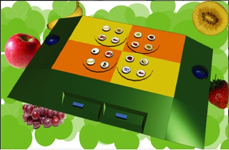Fruit Salad
Tangible Interface Game
 | Supervisor: Participants: Subjects: |
The game concept of Fruit Salad was developed within the Game Design course of the ISNM in 2004 and is based on the metaphor of tangible user interfaces (TUIs) as proposed by Hiroshi Ishii from MIT Media Lab.
Fruit Salad is a board game with fruits represented by RFID lables. The goal of the game is to collect good combinations of individual fruit objects into physical salad bowls integrated into the board. Each of the two salad bowls is connected to an RFID reader, thus making the game logic aware of the current progress of fruit salad preparation. Moreover, a physical push button is used to draw cards from a simulated card deck which indicates a player’s next turn (e.g. move one forward, move two forward, pause, etc.). The board itself is composed of four round discs each of which is connected to a motor. A hollow plastic apple hosts an accelerometer (shaker) sensor which, when used during certain game state, triggers the rotation of the four board discs, thus changing the spatial arrangement of the available fruits.
Through the integration of the physical game board, tangible interaction devices, computer controlled game logic, and computer visualizations, the Fruit Salad game combines advantages of computer games, such as animated multimedia presentations, and traditional, non-computer games, such as its inherently social setting with direct face-to-face communication between the players.
More information can be found at:
- Project Page
-
Bernhard Jung, Andreas Schrader and Darren V. Carlson
Tangible Interfaces for Pervasive Gaming
2nd International Conference of the Digital Games Research Association.
Changing Views: Worlds in Play
Vancouver, British Columbia, Canada, June 16-20, 2005
